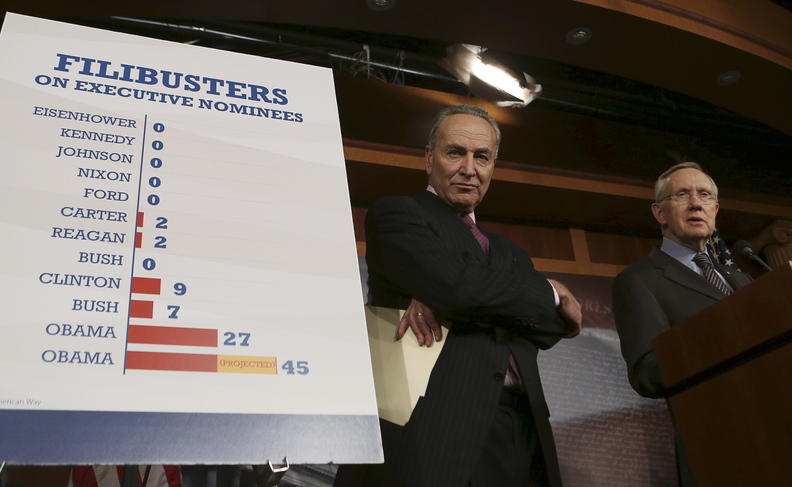WASHINGTON — Senate Democrats, frustrated by what they described as Republican obstructionism, voted Thursday to change the filibuster in order to prevent a minority of senators from blocking action on presidential nominees.
Maine’s two U.S. senators were on opposite sides, with Republican Sen. Susan Collins calling the vote “a terrible mistake” and Sen. Angus King saying he reluctantly supported filibuster reform.
“I am comfortable with this change,” King, an independent who caucuses with the Democrats, said after the vote. “I am sorry it had to come to this but I think the public is just fed up with our inability to do the simplest things, like confirm judges and officials.”
The Senate voted 52-48 to eliminate the tradition of requiring 60 votes in the 100-seat chamber to move forward with judicial and executive nominees. The change will make it easier for President Obama and future presidents to win approval of Cabinet nominees as well as appointments to federal benches.
Supreme Court justices will still have to surpass a 60-vote threshold.
The vote came roughly five months after Democrats and Republicans negotiated an agreement to avoid a similar change. But tensions quickly rose and reached fever pitch in recent weeks as Republicans blocked three nominees to the U.S. Court of Appeals for the District of Columbia Circuit, which is considered the second most important bench after the U.S. Supreme Court.
Senate Majority Leader Harry Reid accused Republicans of abusing the filibuster at unprecedented levels to block qualified nominees in order to achieve other goals. Reid said that more than one-half of filibusters of executive and judicial nominees have occurred during the Obama administration.
“It’s time to change the Senate, before this institution becomes obsolete,” Reid, D-Nev., said on the Senate floor prior to the vote.
Republicans countered that Democrats pioneered the use of the filibuster to obstruct filling DC Circuit vacancies when they were in the minority during the George W. Bush administration. In fact, the two parties were on opposite sides of the exact same debate during an earlier, unfulfilled Republican threat to change the filibuster.
“This is a bad day for the Senate,” said U.S. Sen. Lindsey Graham, R-S.C., who noted that both parties have used the filibuster to their advantage while in the minority – and sometimes with good reason. “Think of all of the nutty ideas [Democrats] have stopped. Think of all of the nutty ideas that we have stopped.”
The change is the most far-reaching since 1975, when a two-thirds requirement for cutting off filibusters against legislation and all nominations was lowered to 60 votes. It would deliver a major blow to Republicans’ ability to thwart Obama in making appointments, though Republicans have promised the same fate would await Democrats whenever Republicans recapture the White House and Senate control, The Associated Press reported.
Reid forced the vote after Republicans voted again to block consideration of Patricia Ann Millett – an experienced litigator from Virginia who was born in Maine – to the U.S. Court of Appeals for the District of Columbia Circuit.
Millett, whose family has deep roots in Maine, was praised as eminently qualified by members in both parties, having argued more than 30 cases before the Supreme Court.
But Republicans contend the court already has enough judges to handle what they portray as a relatively light workload and accused Democrats of simply trying to stack the bench with Obama nominees.
Collins supported Millett’s nomination and opposed the filibuster of Millett and the two other DC Circuit nominees. She also voted Thursday to re-consider Millett’s nomination but joined all other Republicans in opposing Reid’s parliamentary move to change the filibuster. Three Democrats – Sens. Carl Levin of Michigan, Joe Manchin of West Virginia and Mark Pryor of Arkansas – also opposed changing the filibuster.
“As someone who has served a number of years in the Senate, I truly believe (Reid) has made a terrible mistake,” said Collins, who has supported some Republican filibusters but broke with her party on others. “This is contrary to not only the long-standing rules of the Senate but our traditions of respecting minority [party] rights. We’re not the House of Representatives. We’re the Senate.”
King, on the other hand, saw the filibusters as “an abuse of this process.” A former two-term governor, King said he voted reluctantly for the change but pointed out that the Constitution does not require more than a majority vote on presidential nominees.
King acknowledged it is unclear how Thursday’s vote will affect work in the already partisan Senate but said the changes were needed.
“I have no illusions. What happened today is now going to be the rule – Republican presidents, Republican Senates, Democratic, whatever,” King said in an interview. “But I think that is a reasonable rule. Because as a governor I want to be able to have my team and that’s how I am held accountable.”
Former Maine Sen. Olympia Snowe, a Republican who has criticized over-use of the filibuster, was displeased with Thursday’s vote.
Snowe and former Agriculture Secretary Dan Glickman – the co-chairs of a Commission on Political Reform at the Bipartisan Policy Center – said the vote “escalates what is already a hyper-partisan atmosphere in Washington” that has been unable to solve major issues. While filibuster reforms should be discussed, the pair said they should be done “judiciously” with input from all sides.
“These developments, following on the heels of the October government shutdown, only contribute to America’s increasing dissatisfaction with Congress,” Snowe and Glickman said in a statement.
Kevin Miller can be reached at 317-6256 or at:
kmiller@pressherald.com
Twitter: @KevinMillerDC
Send questions/comments to the editors.





Comments are no longer available on this story